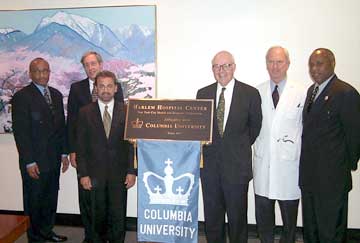
|
|
Those in attendance to commemorate the 38- year affiliation between Columbia and Harlem Hospital Center included, from left to right: John Palmer, executive director of Harlem Hospital Center; President George Rupp; Luis Marcos, president of Health and Hospital Coordination; Thomas Morris, interim dean for clinical and educational affairs of the Faculty of Medicine; Edward Healton, chief medical officer for Columbia╣s new primary care for the elderly in West Harlem, and State senator Bill Perkins.
|
In two commemorative ceremonies, Harlem Hospital Center recently opened and dedicated a new emergency room in memory of Marshall C. England, the former president of the Harlem Hospital Community Advisory Board, and celebrated its 38-year relationship with Columbia╣s College of Physicians & Surgeons.
A ribbon-cutting ceremony for the Marshall C. England Emergency Department at Harlem Hospital brought 200 community residents, leaders and hospital personnel to witness the dedication of a sign and plaque.
The naming of the emergency room honors the lifelong community service work of England, who Congressman Charles Rangel called "the consummate advocate."
The new facility is a Level I Trauma Center, hosting a full service pediatric unit, burn unit and comprehensive psychiatric unit.
Rangel was joined at the dedication by Luis Marcos, president of Health and Hospitals Corporation; Jose Sanchez, senior vice president of Generations Plus Northern Manhattan Network; George Rodriguez, chair of the Council of Community Advisory Boards at Health and Hospitals Corporation, and John Palmer, executive director of Harlem Hospital Center, who served as master of ceremonies.
The ceremony commemorating the 38-year relationship between Harlem Hospital Center and the College of Physicians & Surgeons celebrated an affiliation that has helped thousands of medical students learn and train with urban community oriented residency programs.
Two plaques acknowledging the affiliation were unveiled at the ceremony and later installed on the fašades of the Martin Luther King and Ron H. Brown Pavilions.
The event was attended by both academic and clinical administrators, and community leaders including President George Rupp, State Senator Bill Perkins and Larry Dais, assistant vice president for public affairs and director of community affairs.
"We are pleased to be affiliated with an institution that for 100 years has been a cornerstone of this community, " said Rupp. "Our dedicated faculty combined with the expert direction of the Medical Board have guided the hospital through often turbulent changes in the American healthcare system."
The plaques, Rupp noted, "pay tribute to a medical and academic affiliation that has had a profound impact on the people of Harlem and the surrounding area. It is an affiliation of which all Columbians are very proud."
Dais also recognized the "superb faculty" at Harlem Hospital who have been educating and mentoring young doctors for nearly four decades. "They have helped nurture some of today╣s medical leaders, especially in the field of urban healthcare," said Dais.
|
